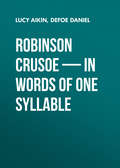
Даниэль Дефо
Atalantis Major
How the Face of Affairs there altered, how some Factions prevailing at Home, made a Breach in all this blessed Harmony, how the faithful Councellors at Home were dismiss'd and disgrac'd, the victorious Generals Abroad ill used and ungratefully treated, by which the Publick Credit sunk at Home, the great Confederates of this glorious Queen were discouraged and allarmed, the Barbarians encouraged to hold out, carry on the War, and reject the Terms of Peace, they would before have complied with: These are Things perhaps my stay in that Place not permitting me to get a full Account of, much less see the Issue of, I shall for the present omit, perhaps my next Voyage may more fully quallifie me to inform you.
My present Relation refers more especially to the Affair of the Election of those representing Nobles, which, as before, the Northern Part of the Island, by a late Treaty of Coalition, were obliged to send up as often as the Soveraign of the Country thought fit to Summon her Hereditary Council to meet, which Summons was generally once in Three Years.
To let you into the Nature of the unhappy Strife which is the Subject of my present Relation, it may be necessary to descend to a Historical Relation of some Facts for a few Years past, and to give the Characters of some Persons who have the principal Conduct in the present Affairs.
There had been a Contention in the last Election in the same Place, (we shall go no further back) of something of the like Nature with this; wherein the same Heat was unhappily breaking out against the Friends and Favourites of the great Queen of the Island, as had now come to a full height; it is too true, That the Factions which then agitated the Nobility being between the Court-Party then so called, and a flying Squadron of Noblemen, who were of the same general Denomination with themselves, that Breach tended so much to the dividing their Interest, that they could never effectually joyn it again, they made that Seperation of Affection then which they could never unite, let in those Enemies then which they could never get removed again, brought those Charges and Accusations against one another then which their Enemies have since made use off, and which they cannot now deny but are fatal to them.
The Parties are so naturally resembling our unhappy Divisions in Britain, have been so exactly pursued by our Methods, are so properly adapted to Persons as well as Things, so alike in Temper, Manners, Management and Design, to our Parties, of Tory, Whig, High Church, Low Church, Old Whig, New Whig, High Flyer, Dissenter, Jacobite, Court, Country, Revolution, Union, and the like. That to give the more lively Representation of them to your Minds, and to avoid the barbarous Words used in the Country, where the Language is altogether unknown to us, and unlike ours, I shall even call them by the same Names, giving a brief Description as I go on, and always desiring you to add a Subintelligitur for the word Atalantick to them all; as the Atalantick Whigs, Atalantick Tories, Atalantick High Church, and so of all the rest: And whenever you meet with the Names or Distinctions of Whig, Tory, High Church, Low Church, &c. in this Discourse, the Author provides against any other Suggestion or Meaning, than that of the Whigs, Tories, High Church, Low Church, Old Whig, New Whig, High Flyers, Dissenters, Jacobites, &c. who are Inhabitants of the famous Island of Atalantis Major, situate beyond the North Cape, between the Degrees of 42 and 80 of Northern Latitude, as you sail from China into Europe, by the Streights of Nassau, the Island of Nova Zembla, (if it be an Island) and the like, being what we call the North-East Passages: And you cannot blame me for being thus Particular in this early Protestation, if you consider how ready the Men of this Age are to Censure, Condemn and Reproach, the Meaning of Authors, whether they themseves have any meaning or no. If any Man shall presume to say, there is no such Place, I may as readily answer their Presumption, by another less Criminal, viz. That they never have past that Way to China, and consequently cannot demonstrate the Truth of what they say.
Having thus premised what I think necessary, to fence this Work against the Malice of the Times, I am next to tell you, That I shall confine this Part of my Account to the Transactions of the Northern Part of this great Island, and therein to what happened in this Case of the Election of their Noble Councellors only; yet I must Hint a little at what had been transacting in the Southern Parts of the Island; and this is absolutely necessary, in order to make the other Accounts intelligible.
In order to this, you are to understand, That the Southern Part of the Island was the most remarkable of any, as to the Policy of their Government, and the Character of the People; and excepting Englishmen and Polanders, there is not such another Nation in the World: Here they reckoned about Fifty three several Sects, Divisions, and espoused Opinions in Religion, upon most of the Heads whereof the People actually seperated from one another; such as, (1.) Churchmen, and among them High Church, Low Church, Non Jurors, Prelatists, Socinians, Arians, Arminians, Deists, Atheists, Immoralists, Flyers, Soul-Sleepers, Prophets, &c. (2.) Presbyterians, and under that head all kind of Dissenters, Cameronians, Independants, Anabaptists, Baptists, Seventh-Day-Men, Sabatarians, Donatists, Gnosticks, Antiprelatists, Muggletonians, and various undistinguishable Quakers both wet and dry, Sweet Singers, Family of Love, Christian Jews, Jewish Christians, and the like. In the State, the Divisions were no less Fatal, or the variety greater in Proportion, these we may, as I said before, call by the Names which the like Factions are distinguish'd by here; such as Tory, Whig, Low Church, HotWhig, Old Whig, Modern Whig, High Flyer, High Church, High Tory, a Gillicranky, a Tantivy, Tackers, Non Jurors, Assassinators, Junto's, Squadroni, Court, Country, Revolutionists, Non Resisters, Passive Obedience Men, and the like.
You may understand, that the Queen of the Island had thought fit to change Hands in the Administration just before I came there, and tho' it was given out that the change would not be from what we call here a Whig to a Tory Ministry, in effect it past for no other, especially for that the Whigs were generally laid by in every publick Matter, and the Tories, or at least such as had appear'd with them were all taken in.
Among the Persons turn'd out of Employ, or very much envy'd in it, we find two great Personages, Men of the greatest Eminency in their Station that the Age had produc'd in that Island, their Country had no Error to find in their Conduct except it were that it was so much in debt to their Services, that they could not be capable of rewarding it, therefore like the corrupted Nature of the whole Race of Man, they hate the Men, as a late Author says, because they hate to be in debt beyond the Power of Payment.
One of these presided over the Treasure, the other over the Army, and except what may have happen'd since those days, their very Enemies had not been able to assign any Reason from their own Behaviour, why they dismist them. Of these more in the Process of the Story.
For the present it shall suffice to tell you, without other Preamble, both these were by the Artifice of their Enemies, dispossess'd of the Queen of the Island's Favour, and that with them fell the Juncto's and Squadrons of their Friends in most Part of the Southern Atalantis.
In the North Part of the Island the Divisions of the Court had not extended so far, at least they had not been push'd so vigorously, the great Officers kept their Posts, whether Civil or Military, not the least Alteration was made, except of a few inferiour Officers, and those but casually; all seem'd to stand at a Stay till the Election of the noble Councellors aforesaid, and till the sitting of the great Council, as above.
There were some of the Nobility of these Northern Parts that had very much the Favour of their Prince, and by whom she had always been directed in those things that related to that Part of Her Dominions, These were,
1. The Duke de Sanquarius, a Northern Prince of great Reputation who had the principal Trust in the Management of the late Coalition, which, as is noted already, had formerly been made between this Northern Part of the Island and the Southern. This Prince was a Person of great Prudence and Policy, perfect Master of the Interest, Temper and Constitution of the Country and People; great and as a Master of his own Passions, that had an Insight into Persons as well as things, and was, without Dispute, the best qualify'd to manage that uneasy People, of any Man in that Part of the Island: He had a leading Interest among them, and us'd it with such Temper and such Clearness of Judgment, as seldom failed to bring to pass whatever he undertook. He was Viceroy in the great Meeting of the States of that Country, several times; in which he behav'd to the Satisfaction of his Sovereign and the general Good, even to the Confession of his Enemies, after the separate Government of that Part of the Island ceas'd he was receiv'd very graciously by the Queen, and made principal Secretary of State.
2. The Earl of Stairdale was another, a Nobleman of extraordinary Merit, distinguish'd for a thousand good Qualities; affable, generous, exceeding curteous, steddy in a sound Principle, wise above his Age, brave above his Neighbours. His Family had been famous for the Gown, he was like to make it more so by the Sword: He had at this time a very honourable Command in the Armies of Atalantis Major, and being the same thing as we call a Lieutenant General, was employed against the Tartarians.
3. The Earl of Crawlinfordsay a Nobleman of a most ancient Race, being the first of his Degree in the whole Atalantis Major, an honest, bold, gallant Person; he had so much Goodness in his Temper, Courage in his Heart, and Honesty in his Face, that made all Men love him; he was true to his Sovereign, and tho' his Fortunes too depended upon the Court, being Captain of the Queen's Guards, yet so true to his Honour, that he scorn'd to sacrifice his Principle to his Interest; had too much Courage to be bully'd, and too much Honesty to be brib'd; too much Wit to be wheedl'd and too much Warmth to forbear telling it in the Teeth of those that try'd all those ways to bring him into their Party.
4. The Prince of Greeniccio of the ancient Blood of Agyllius. This was a young Nobleman of great Hopes, and from whom great things were expected, an account of the very Race he was descended from. Had he inherited the Principles of his Family as he did the Honour and Estate, he must have been the Head of that very Party he now acted against, being the same for whose Cause two of his greatest Ancestors at least had both ventured and lost their Lives, but Grace not going by Generation, nor Vertue by Inheritance any more in that Country than in ours. He neither own'd their Cause or imitated their Vertue, but gave himself up first to all Manner of Vice, and then with his Morals abandoned his Principles, flew in the Face of his Grandfathers injured Grave, join'd with his Murtherers, and the abhorr'd Betrayers of his Country, and plac'd himself at the Head of that very Party who had trampled on the Blood of his Family as well as Nation. He was in Temper brave but rash, had more Courage than Generosity, more Passion than Prudence, and more Regard to his Resentment than to his Honour; he was proud without Merit, ambitious without Prospect, revengeful without Injury; he would resent without Affront, and quarrel without Cause, would embroil himself without Reason, and come out of it without Honour: His Courage was rather in his Blood than in his Head, and as his Actions run often before his Thoughts, so his Thoughts often run before his Reason; yet he was pushing and that supply'd very much his Want of Policy; but he discover'd the Errors of his Judgment by the Warmth of his Behaviour in every thing he did he sought no Disguise, every Man knew him better than himself, and he never could be in a Plot because he conceal'd nothing.
He was a General in the Armys of Atalantis Major and excepting the chief Command of an Army, was very well fitted for the Field: He had behav'd himself very well on several Occasions against the Tartarians, and unless his ill Fate should place him above being commanded, he might in time be a great Man; at present, having all the Fire of a General without the Flegm, his great Misfortune and the only Thing that can ruin him is, That he thinks himself qualifyed to Command, and cannot bear the Lustre of their Merit that excel him.
5. The E. of Marereskine: This was a Nobleman whose Character is not so easy to describe; he appear'd in the Service of the Queen of the Island, but was suspected to lean to the Tartars, whose Interest he was known formerly to espouse; He was proud, peevish, subtle and diligent, affected more the Statesman than the Soldier, and therefore aim'd at the Place the Duke de Sanquharius enjoy'd of Secretary of State, but had not yet had his Ambition gratifyed.
You are to note also that the Queen of the Island had for several Years committed the Administration of her Affairs to two extraordinary Persons, Natives of the South Parts of the Island. The Prince de Heymuthius and the E. of Dolphinus, their Characters may be confin'd to this: In short, the first commanded all the Armies of Atalantis Major, and was Captain General and Commander in Chief; the other, High Keeper of the Treasury of the Island, the greatest General and the greatest Minister of State the Island ever knew, who had raised the Glory of their Mistress, and the Honour of their Country, to the greatest Pitch the Age has ever seen; whose Merit I can no more describe than the Nation can requite.
Tho' these Characters seem to take up too much room in this Tract, yet it could not be avoided, it being impossible to let you into a true Notion of the Farce that was acted afterwards if the Actors had not been thus described.
Greeniccio was a Peer of the whole Island, and therefore had no Vote in the Northern Election, being one of the Hereditary Council aforesaid; but taking upon him the absolute Direction of the Affair, tho' he had really, as above, nothing to do with it, he rendred himself at the City Reeky, the Capital of that Part of the Kingdom a few Days before the Election.







